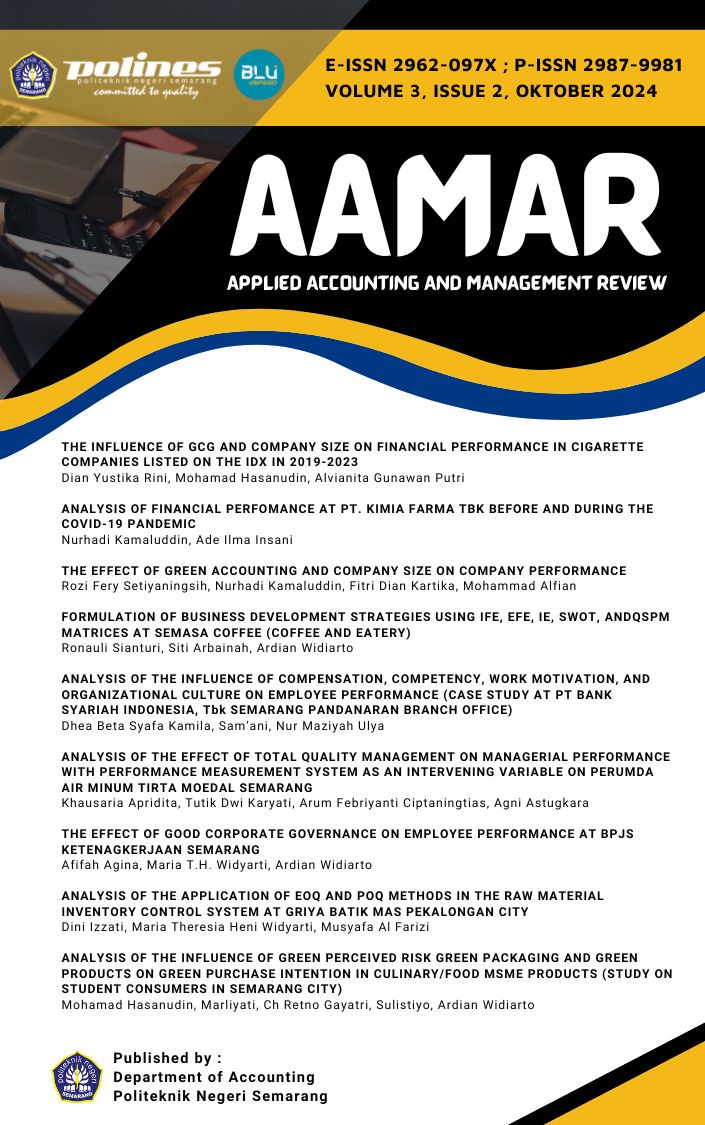ANALYSIS OF THE EFFECT OF GREEN PERCEIVED RISK, GREEN PACKAGING, AND GREEN PRODUCT ON GREEN PURCHASE INTENTION ON CULINARY OR FOOD MSME PRODUCTS (STUDY ON STUDENT CONSUMERS IN SEMARANG CITY)
DOI:
https://doi.org/10.32497/aamar.v3i2.6167Abstract
After experiencing the Covid-19 Pandemic starting in 2023, the Indonesian economy began to rise but has not fully reached normal conditions. The same condition is also experienced by the MSME sector, especially the culinary / food sector. The impact of the economic recovery after the covid pandemic also has an impact on the increasing amount of waste. According to the Semarang City Environmental Agency (DLH), during the pandemic waste production started at 900 tons, even down to 650 tons, but now in 2022 after the covid pandemic began to end the amount of waste began to rise to 1200 tons of waste per day. This study aims to determine and analyze whether or not there is a relationship between the green economy perception variable which consists of: Green Perceived Risk Green Packaging and Green Product on Green Purchase Intention among students in Semarang city related to the implementation of Semarang mayor regulation no.27 of 2019 concerning plastic waste control in Semarang city. Data collection was carried out using a questionnaire or questionnaire method and observation. The data analysis method used in this research is Structural Equation Modeling with the Partial Least Square (SEM-PLS) algorithm approach. Based on the results of this study, it will be concluded that the effect value of Green Perceived Risk (X1) on Green Purchase Intention (Y) is a negative and insignificant effect on the attitude of desire to buy green products, thus H1 is rejected. The effect value of Green Packaging (X2) on Green Purchase Intention (Y) is a positive and insignificant effect on the interest in buying green products, thus H2 is rejected. The value of the influence of Green Product (X3) on Green Purchase Intention (Y) is a positive and significant effect on the interest in buying green products, thus H3 is accepted.References
Alamin, R. F., & Ratnasari, I. (2019). The Effect Of Green Marketing Concept On Consumer
Intention To Buy Savana Project Product. Jambura Science of Management, 1(2), 54”“
https://doi.org/10.37479/jsm.v1i2.2499
Albino, V., Balice, A., Dangelico, R.M. (2009). Environmental strategies and green product
development: an overview on sustainability-driven companies. Business Strategy and
the Environment, 8(2), 83-96.
Bank Indonesia. 2015. Profil Bisnis Usaha Mikro Kecil Menengah (UMKM). Laporan Akhir.
Jakarta.
Barber, N. (2010), “Green wine packaging: targeting environmental consumers”, International
Journal of Wine Business Research, Vol. 22No. 4, pp. 423-44
http://dx.doi.org/10.1108/17511061011092447
Draskovic, N., Temperly, J. & Pavicic, J. (2009). Comparative perception(S) of consumer
goods packaging: Croatian consumers”™ perspective(S). International Journal of
Management Cases, 11 (2), 154-163.
Hartono, Maulina, Noviandari, A., Sukirno, & Sholeh, M. (2021). Green Business Umkm Di
Kota Depok. Jurnal Komunitas : Jurnal Pengabdian Kepada Masyarakat, 3(2), 83”“89.
https://doi.org/10.31334/jks.v3i2.1268
GIZ. 2015. In: Benefits of a Green Economy Transformation in Sub-Saharan Africa. Germany.
Jauhari H. 2017. Promoting SME”™s green industries. INFOKOP, 24(2): 13 -27.
Juliana, Arifin Djakasaputra, and Rudy Pramono. (2020). “Green Perceived Risk, Green Viral
Communication, Green Perceived Value Against Green Purchase Intention Through
Green Satisfaction.” Journal Industrial Engineering & Management Research(
JIEMAR) 1 (2): 124”“39.
J.K. Musango, A.C. Brent, A.M. Bassi. 2014. “Modelling the Transition towards a Green
Economy in South Africa.” Technol. Forecast. Soc: 257”“273.
Khairin, F. N., Ginting, Y. L., Kusumawardani, A., & Syakura, M. A. (2021a). UMKM
TANGGUH : Digitalisasi dan Transformasi Hijau. Pustaka Aksara.
Kong Wilson, Harun Amran, Sulong Rini Suryati, Jaratin Liliy. (2014). “International Journal
of Asian Social Science The Influence Of Consumers ”™ Perception Of Green Products
Amran Harun Rini Suryati Sulong Jaratin Lily Contribution / Originality.” Asian Social
Science 4 (8): 924”“39.
Kruja A. 2013. The Contribution of SMEs to the economic growth (case of Albania). Journal
BRAND (Broad Research in AccountingNegotiation, and Distribution) 4(1): 31 ”“ 42.
Lin, C. Y.-Y., and M. Y.-C. Chen. 2007. Does innovation lead to performance An empirical
study of SMEs in Taiwan. Management Research News Vol. 30 No. 2,:pp. 115-132.
Noviardy A, Mellita D. 2014. Implementasi green marketing pada usaha kecil menengah di
Kota Palembang. Seminar Nasional and Call For Paper Economic Globalization: Trend
& Risk for Developing Country, 22-24 Mei 2014. Universitas Maranatha. Bandung.
Okada, E.M. & Mais, E.L. (2010). Framing the green alternative for environmentally conscious
consumers, sustainability accounting. Management and Policy Journal. 1 (2), 222-234.
Pankaj, K.A. & Vishal, K.L. (2014). Consumer adoption of green products and their role in
resource management. Indian Journal of Commerce & Management Studies. 5 (3), 22-
Rizwan, M., Asif, R. M., Hussain, S., Asghar, M., Hassan, M., & Javeed, U. (2013). Future of
Green Products in Pakistan: An Empirical Study about Green Purchase Intentions.
Asian Journal of Empirical Research, 3(2), 191 ”“207.
http://www.aessweb.com/download.php?id=1815
Saxena, R.P. & Khandelwal, P.K. (2012). Greening of industries for sustainable growth: An
exploratory study on durable, non-durable and services industries. International Journal
of Social Economics, 38(9), 551 -586.
Shan Chen, Yu, Shyh-Bao Lai, dan Chao-Tung Wen, 2006, ”•The Influence of Green
Innovation Performance on Corporate Advantage in Taiwan”–, Jurnal of Business Ethics.
:331-339
Sriyono. 2014. Implementation of Green Economy on The Development of SMEs in Sidoarjo
District. The Third International Conference 0n Entrepreneurship and Business
Management (ICEBM) Penang. 6-7 November 2014. Malaysia.
Steinfield. 2012. Small and medium-sized enterprises in rural business clusters: the relation
between ict adoption and benefits derived from cluster membership. The Information
Society. 28: 110”“ 120.
Sugiyono. (2017). Metode penelitian kuantitatif, kualitatif, dan kombinasi mixed methods.
Alfabeta.
Sunyoto, D. (2012). Konsep dasar riset pemasaran dan perilaku konsumen. CAPS (Center for
Academic Publishing Service).
Utomo, M. N., & Pratiwi, S. R. (2021). Analisis Penerapan Green Business Terhadap Kinerja
Ukm Di Kota Tarakan. Jurnal Akuntansi, Keuangan, Pajak Dan Informasi (JAKPI),
(1), 113”“121. https://journal.moestopo.ac.id/index.php/jakpi/article/view/1348






